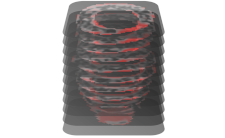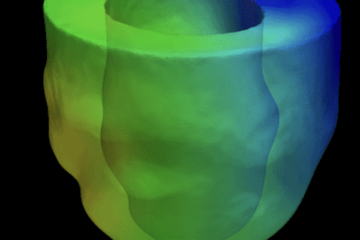ADVANCE launches to bridge the gap between engineering and medicine
Members of the Alliance for Cardiovascular Diagnostic and Treatment Innovation (ADVANCE) and key Johns Hopkins leadership gathered to celebrate the launch of ADVANCE, the new interdisciplinary research center between the Whiting School of Engineering and the Department of Medicine that is posited to revolutionize the diagnosis and treatment of cardiovascular diseases.
A collaboration between prominent biomedical engineers and cardiologists, ADVANCE is co-directed by Natalia Trayanova, PhD, the Murray B. Sachs Professor in the Department of Biomedical Engineering at the Johns Hopkins University Schools of Engineering and Medicine and Hugh Calkins, MD, professor of medicine at the Johns Hopkins University School of Medicine and director of the Cardiac Arrhythmia Service at The Johns Hopkins Hospital. The innovative center developed from five years of collaboration between researchers and clinicians and aims to improve the diagnosis and treatment of heart rhythm disorders through pioneering advances in cardiac imaging, computer simulations, and data science.
At the center’s December 12 launch celebration Trayanova and Calkins spoke, graciously acknowledging the leadership, faculty, clinicians, research scientists, trainees, and administrators who form the ADVANCE team as well as Johns Hopkins leadership for their support.
Trayanova shared her vision for ADVANCE, “I believe we are different from the typical research centers where engineers and clinicians collaborate. We do not aim that we, engineers, publish great research with the help of clinicians and then wait for clinicians to decide whether they want to try the approach on patients. Although we expect to produce great papers along the way, we, are now also part of the actual clinical studies. We would like to think of ourselves as embodying ‘translation in action’.”
“This program, made possible by the close collaboration of the arrhythmia clinical program and Dr. Trayanova’s engineering program, has the potential to transform catheter ablation procedures for the benefit of our patients. Rather than the one-size-fits-all approach used today, we will use novel engineering approaches to tailor the ablation set to each specific patient. This is a terrific example of personalized medicine, ” said Calkins on the promise of ADVANCE to impact precision cardiology.
The following leaders in the Whiting School of Engineering and the Department of Medicine offered words of recognition and support for Trayanova, Calkins, and their team and acknowledged the role of ADVANCE in the innovation and future of medicine: Mark Anderson, MD, PhD, William Osler Professor of Medicine and director of the Department of Medicine; T.E. Schlesinger, PhD, Benjamin T. Rome Dean and professor of electrical and computer engineering at The Whiting School of Engineering; Michael I. Miller, PhD, professor and director of the Department of Biomedical Engineering; and Ronald Berger, MD, PhD, interim chief of cardiology at The Johns Hopkins Hospital.


